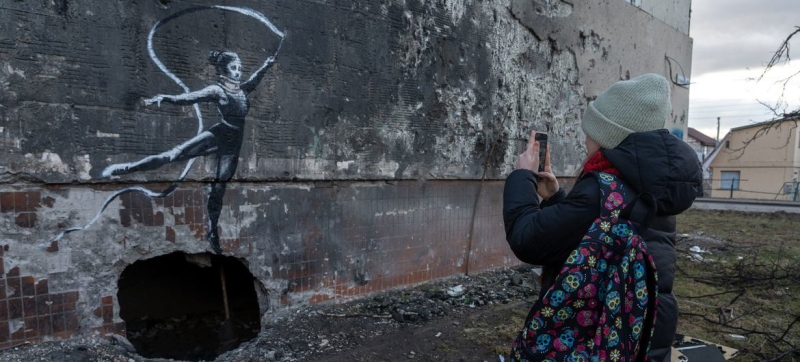
“Ballerina” by artist Banksy in Irpen, Ukraine. Main news of the day | Monday: Future Summit, Middle East, Russia, Belarus, WHO UN
The main news in the UN and in the world: the second day of the Summit of the Future, escalation on the Lebanese-Israeli border, the use of torture by Russian authorities against Ukrainians, increased repression in Belarus ahead of elections, the mental health of adolescents.
The Summit of the Future: Day Two
Dozens of speakers, numerous events on the sidelines – the High-Level Week at UN Headquarters continues and the two-day Future Summit is coming to an end. The day before, its participants unanimously adopted the Pact for the Future, which lays the foundation for further work for the benefit of future generations. In his speech at the Summit, the head of the UN Food and Agriculture Organization Qu Dongyu called for changing agricultural systems to ensure food security for all the inhabitants of the planet, supporting the corresponding provision of the Pact. The head of the International Telecommunication Union, Doreen Bogdan-Martin, recalled the existing digital divide, saying that it is necessary to provide every person on earth with access to the Internet.
Escalation on the Lebanon-Israel border
UN Secretary-General António Guterres is gravely alarmed by the escalation of the situation along the Blue Line and reports by the Lebanese authorities of a large number of civilian casualties, including children and women. This is stated in a statement issued on behalf of the UN chief by his press service. The Secretary-General is also concerned about the ongoing Hezbollah strikes on Israel. Antonio Guterres reiterated the urgent need for immediate de-escalation and the search for a diplomatic solution.
Use of Torture by Russian Authorities
The Independent International Commission of Inquiry on Ukraine has uncovered new evidence demonstrating widespread patterns of torture by Russian authorities against Ukrainian civilians and prisoners of war in the occupied Ukrainian territories and in the Russian Federation. The wide geographical scope and distribution of the torture patterns indicate that such practices are considered acceptable and are regarded as routine. At the same time, those who use them do not fear punishment for their actions. The Commission reports this in its latest update to the Human Rights Council.
Repression in Belarus
Repression and intimidation aimed at silencing dissent in Belarus have intensified in the run-up to the 2025 presidential election, Karinna Moskalenko, head of the Group of Independent Experts on Belarus, said at a meeting of the UN Human Rights Council. The independent experts continue to document the abuse of criminal law to suppress any dissent in Belarus. Individuals perceived as political opponents are arrested for exercising their legitimate rights to freedom of expression and association. Torture and ill-treatment are widely used by law enforcement officials against individuals arrested in connection with their participation in the 2020 protests.
Adolescent Mental Health
At least one in seven teenagers worldwide suffers from a mental disorder. The UN World Health Organization (WHO) issued this warning, calling for increased investment in psychological care. WHO Director-General Tedros Adhanom Ghebreyesus said that failure to address adolescent mental, sexual and reproductive health issues will have serious and life-threatening consequences for young people. It will also cost society a lot of money. The head of WHO noted that anaemia among adolescent girls remains widespread, and almost one in ten teenagers is obese.
